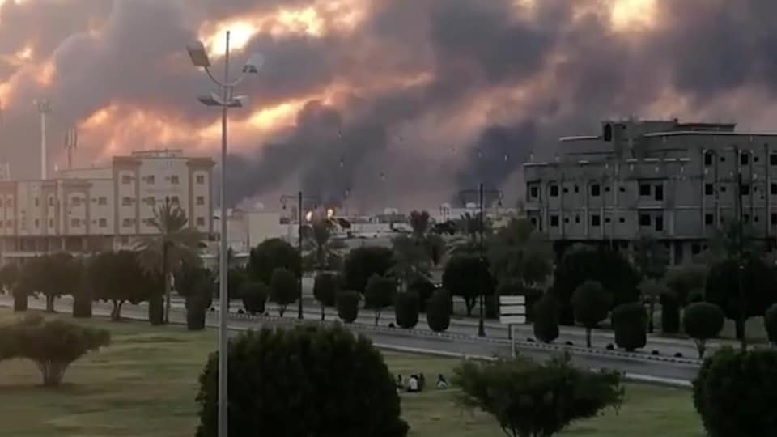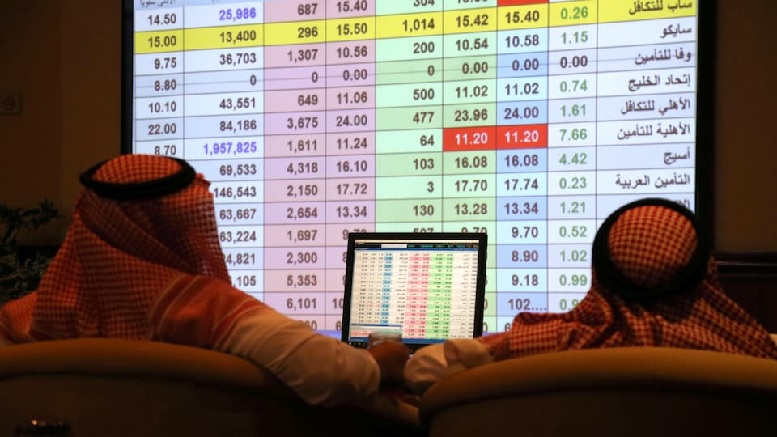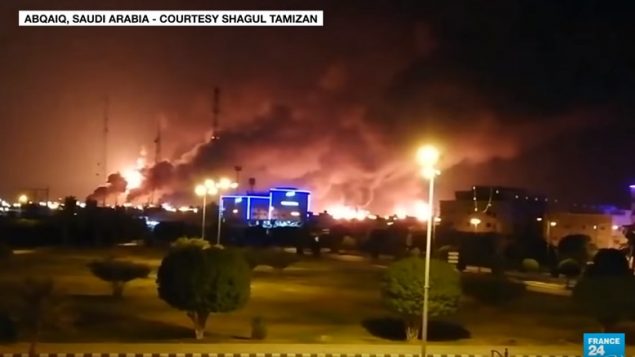Two Saudi oil refineries suffered a surprise attack on Saturday by drone or small cruise-type missiles. The U.S is blaming Iran and rattling its sabre. The regional Houthi rebels in Yemen however are claiming responsibility.
World oil prices are affected, as is regional stability, seemingly always tenuous at best.
James Devine, associate professor in political science and international relations at Mount Allison University in New Brunswick, specialises in the politics and foreign policy of Iran.
The major attack was on the Abqaiq refinery, the largest processing facility in the world which processes about seven million barrels of crude per day. At least 17 hits on various portions of the refinery were carried out. Two other hits were seen on infrastructure at the Khouris plant which processes about a million barrels of crude per day.

Thick smoke fills the air at Abqaiq from the many fires. Abqaiq was one of two refineries attacked on Saturday. The extent of damage at the two refineries is not yet known, nor the eventual effect of oil prices and world economy. (Reuters)
Saudi production has been halved which represents about 5% of the world’s supply.
This has resulted in an immediate spike in oil prices, but which also seems so far not to be long-lived.

In July, Houthi officials unveiled their locally produced version of the Quds-1 cruise type drone missile. These are believed to be used in the oilfield attacks. (Houthi media- via bulletin of the atomic scientists)
Professor Devine says that if indeed Iran is behind the attack it could be their way of demonstrating that if the U.S with its sanctions is attempting to harm Iran’s economy, they have ways of fighting back and affecting the U.S and its allies.

Analysts from the Saudi bank ANB follow oil prices on the world markets on Monday following the refinery attacks as prices initially jumped. (Reuters-Stringer)
He also says if it was the Houthis, it could be as a proxy for Iran, or perhaps for their own purposes as retaliation for Saudi support of their enemies in the Yemeni civil war.
While oil prices may stabilize, experts are uncertain about stability in the region as a result of the attacks. For the moment everyone seems to be taking a “wait and see” position.
Meanwhile analysts are suggesting that this could provide some pressure in the U.S to approve the Keystone XL pipeline to Canada’s oilfields, promoted by many, including Alberta’s Premier, as the most secure source of oil in the world.
Additional information-sources
- BBC: Sept 16/19: Images show details of damage
- Financial Times: H Warrell: Sep 17.19: Attack highlights drone wars in Middle East
- CBC: T Seskus: Sep 17/19: What the attacks could mean for Canada’s oilpatch and Keystone XL pipeline
- Al Jazeera: Sep 16/19: updates on refinery attacks
- France 24 (English): Sep 15: video report-YouTube
- Arms Control Wonk: analysis of Quds-1 and oil attacks







For reasons beyond our control, and for an undetermined period of time, our comment section is now closed. However, our social networks remain open to your contributions.